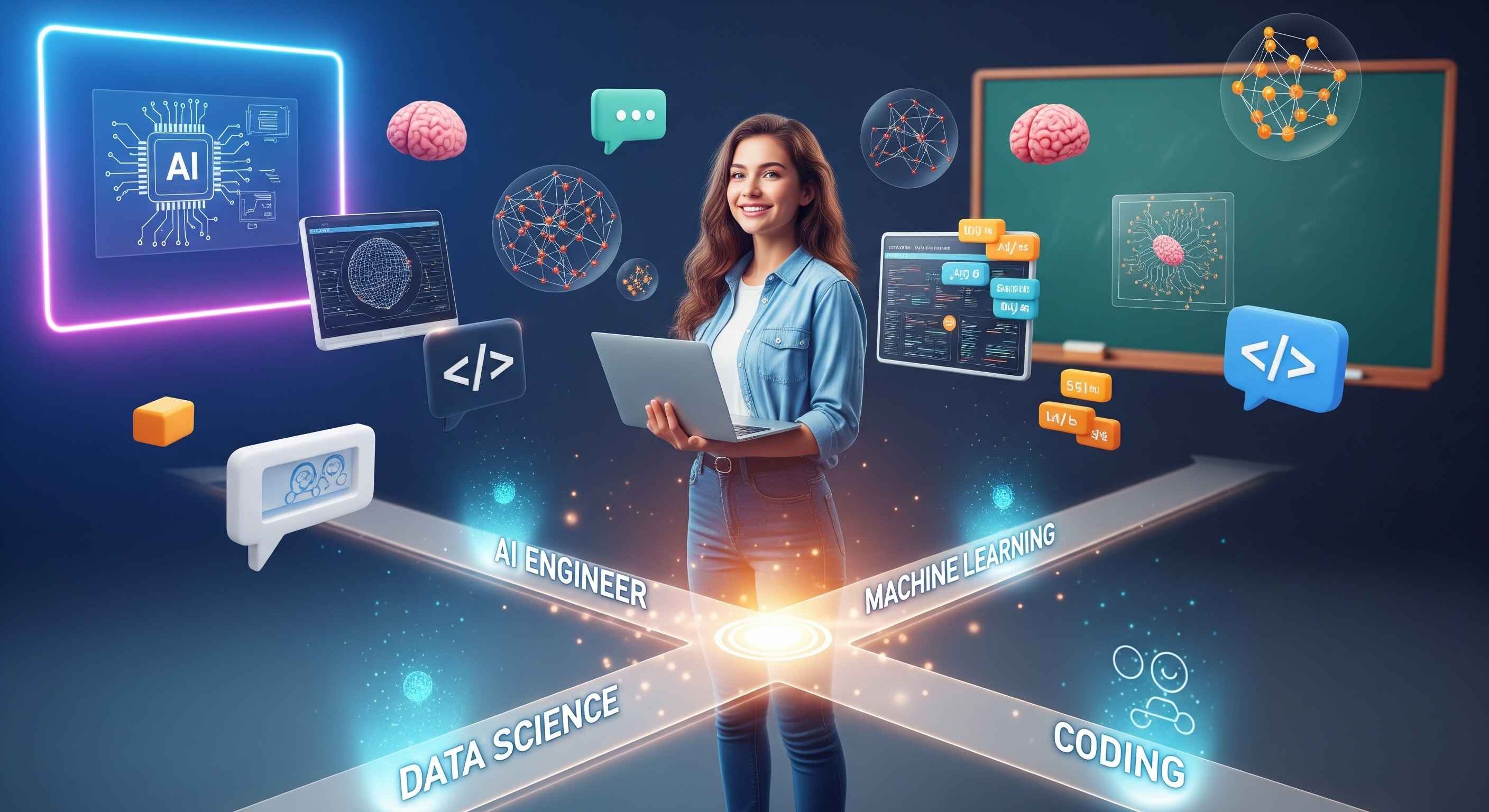Want to know how to become an AI engineer after 12th but not sure where to begin? You don’t need to be from IIT or a coding expert already. In this guide, we’ll explain in very simple words how you can start your journey — which course to choose, what skills to learn, and how to build real AI projects from scratch. Whether you’re from science, commerce, or arts — this is for you.
We’ll show you everything step-by-step: which subjects matter, how much coding you need, which free tools and websites to use, and what kind of jobs you can get in AI. No boring theory here — just real answers and working tips to help you start building smart apps like ChatGPT or AI chatbots, even from your laptop at home.
- 👋 What Is AI Engineering for Beginners?
- 🎯 Who Is an AI Engineer or AIML Engineer?
- 🏁 How to Become an AI Engineer After 12th (Step-by-Step Plan)
- 📘 Step 1: Choose the Right Course After 12th
- 📗 Step 2: Learn Programming (Start With Python)
- 📊 Step 3: Learn Math Basics for AI
- 🧪 Step 4: Learn AI/ML Concepts
- ⚙️ Step 5: Learn Tools Used by AI Engineers
- 🧰 AI Course Details: What to Learn, Where to Learn
- 🧰 Shortcut Path: No College? Still Want to Become AI Engineer?
- 📈 AI Engineer Salary – India vs USA
- 🧑💼 What Jobs You Can Do as an AI Engineer
- 📦 Want to Become AI Engineer? Start By Making These Small Projects
- ✅ Final Checklist: How to Become AI Engineer After 12th
- 🙋 FAQs – Most Asked Questions About Becoming AI Engineer
👋 What Is AI Engineering for Beginners?
AI engineering means building smart systems that can learn, solve problems, or talk like humans. It includes writing computer programs that use data to get better over time. If you’ve used ChatGPT, Alexa, or seen movie suggestions on Netflix — that’s AI in action.
Here is what an AI program can do:
- 🗣️ Talk and understand you (like ChatGPT or Siri)
- 👀 See and understand pictures (like face unlock in phones)
- 🧠 Learn from data (like YouTube recommending videos)
- 🤖 Control robots or smart devices
AI engineers build and train these smart systems. They work in many industries like:
- 🚗 Self-driving cars
- 🏥 Healthcare (e.g., cancer detection)
- 📱 Mobile apps (e.g., filters, voice assistants)
- 💼 Business tools (e.g., fraud detection)
In AI engineering, you deal with topics like machine learning, deep learning, data, and smart algorithms. And yes, it’s not just about coding — it’s about solving real-life problems using smart tech.
If you’re thinking what’s inside an AI engineer job description, it includes building and training models, working with data, writing Python code, and making sure AI gives correct answers.
🎯 Who Is an AI Engineer or AIML Engineer?
👉 An AI Engineer or AIML Engineer is a person who builds smart systems using data and machine learning. They teach computers how to learn things, find patterns, and solve problems — just like a brain behind the machine.
They use tools like:
- Python
- TensorFlow
- OpenAI APIs
- LangChain, and more.
📊 They also work with data — collecting, cleaning, and using it to train models. These models help apps do tasks like:
- Chatting with users (chatbots)
- Predicting movie choices
- Detecting fake news
- Translating languages
In short – AI Engineers are the people who make machines think smart. They mix coding, math, and AI tools to solve real-life problems.
🏁 How to Become an AI Engineer After 12th (Step-by-Step Plan)
After class 12th, your first step is to pick the right AI course. If you’re from science stream, it’s easier — you can go for B.Tech in AI, B.Sc. in CS, or BCA with AI electives.
But even if you’re from commerce or arts, you can still take AI courses after 12th through online platforms or diploma options. These courses give you a strong base in Python, maths, logic, and problem solving.
Want to know how to become AI engineer after 12th? It starts with small steps — learn coding basics, understand data, then move to machine learning.
Here’s the exact roadmap for students after 12th (any stream — Science preferred):
📘 Step 1: Choose the Right Course After 12th
👉 So you just finished class 12th and now thinking — “How to become an AI engineer?” You may feel confused, but don’t worry. Your journey starts by picking a good course that teaches coding, AI, and logic thinking.
The best course after 12th is B.Tech or B.E. in Artificial Intelligence. This course is made specially for AI learning — it covers coding, math, machine learning, and real-world projects.
If you don’t get AI-only branch, go for Computer Science (CSE) with AI/ML as your extra subject or specialization. Many colleges now give this option.
✏️ AI courses after 12th you can take:
These programs can help kick start your aspirations to become an AI engineer.
- BSc in AI, Data Science, or Computer Science – These are theory-based but also good for AI career.
- BCA (Bachelor of Computer Application) + later do MCA with AI or ML as focus area.
- Online degrees or distance learning in AI or CS – Cheaper option if you have less budget. Just add good certificates with it.
🎓 List of top colleges that give AI engineer course:
We’ve outlined some of the top-notch engineering centres both in India and outside.
Places in India:
- IIT Hyderabad (B.Tech in AI) – Full B.Tech in Artificial Intelligence.
- IIIT Hyderabad (CSE with AI) – Offers strong CSE with AI, robotics, and deep learning.
- SRM, UPES, Amity for AI – Private colleges with proper AI/ML engineering degrees.
Outside India:
- Carnegie Mellon (USA) – Top in AI and robotics research.
- Arizona State University (USA) – Offers AI and Data Science for international students.
- University of Toronto (Canada) – Great for research and AI tools.
🧾 These courses cover full AI course details like Python, algorithms, machine learning, deep learning, and even projects. You don’t need to be super genius — you just need to learn step by step.
📗 Step 2: Learn Programming (Start With Python)
👉 To become AI engineer, you must learn coding, and the best way to start is with Python. It’s simple, clean, and made for beginners — that’s why most AI tools use it.
🧠 With Python, you can easily:
- Write basic code
- Work with data
- Train AI models
- Build small projects step-by-step
📚 Free places to learn Python:
🛠️ Want to practice? Try these:
📊 Step 3: Learn Math Basics for AI
👉 You don’t need to be math topper, but to work in AI, some basic math is must. These help your AI models work better and smarter.
Here are main topics and why they matter:
| 🧮 Topic | 📌 Why It Matters in AI |
|---|---|
| Linear Algebra | It helps in working with images and deep learning tools |
| Probability | Used for predictions — like spam filters or AI guesses |
| Statistics | Helps to understand and clean the data before training |
| Calculus | Needed when training models, just learn the basic part |
📘 Where to learn (free & easy):
- Khan Academy – Best for step-by-step basics
- 3Blue1Brown – Visual videos that explain complex math in fun way
🧪 Step 4: Learn AI/ML Concepts
👉 To become AI engineer, first you must understand how AI really works. Start with machine learning (ML) — it teaches computers to learn from data. After that, go for deep learning, NLP (natural language processing), and generative AI like ChatGPT.
🎓 Best beginner courses to start with:
Click to search them directly on TechBeamers 🔍
- 🤖 AI For Everyone by Andrew Ng (Coursera) – Easy to understand, no coding needed at start.
- 🧠 Intro to Machine Learning – Kaggle Learn – Practical and simple, learn by doing small projects.
- 💬 ChatGPT Prompt Engineering – DeepLearning.ai – Teaches how to talk smartly with AI tools.
⚙️ Step 5: Learn Tools Used by AI Engineers
Here are some ready-to-use tools you must learn:
| Tool | What It Does |
|---|---|
| Python | Main coding language for AI |
| Jupyter Notebook | For writing and testing AI code |
| Pandas, NumPy | For data handling |
| scikit-learn | Easy ML models |
| TensorFlow, PyTorch | Deep learning |
| LangChain | Building smart agents with LLMs |
| OpenAI API | Using ChatGPT in your app |
| Hugging Face | Pre-trained models ready to use |
👉 Start building mini projects like:
- Sentiment analysis from Tweets
- AI chatbot using OpenAI API
- Face detection app using OpenCV
The most helpful part is: many AI engineer course programs now include hands-on projects where you build your own chatbot, image recognizer, or recommendation system.
🧰 AI Course Details: What to Learn, Where to Learn
A good ai course will teach you basics like Python, data handling, and logic. Then it covers deep concepts like machine learning, neural networks, and natural language processing (NLP).
Some of the most trusted ai course details can be found on platforms like:
- ✅ Coursera (AI by Stanford)
- ✅ Google AI (free learning path)
- ✅ IIT Madras BSc in Data Science (no entrance exam!)
- ✅ Udacity’s AI Nanodegree (paid but industry-level)
If you’re not ready for a full degree, start with short AI courses after 12th — even 2-month programs give you real skills and a certificate.
💼 What AI Engineers Actually Do (And Where They Work)
So, what’s really the job of an AI engineer? Here’s a simple version of the AI engineer job description:
Many AI engineer roles today involve working in NLP (like ChatGPT), vision AI (like Tesla cameras), or recommendation systems (like YouTube).
Companies hiring AI engineers: Google, Amazon, Infosys, TCS, and even start-ups. Salary can start from ₹5–7 LPA and go up to ₹30 LPA+ with experience.
🧰 Shortcut Path: No College? Still Want to Become AI Engineer?
Yes, even if you don’t go to college, you can still become an AI engineer. Many people are doing it. You just need to learn smart and show your skills. Here’s how:
✅ Start with Google’s AI or TensorFlow Developer Certificate
These are real certificates by Google. They teach you how to build smart models. You can add them to LinkedIn and resumes. The best part? You learn step by step, in your own time.
✅ Use Coursera / Udemy / YouTube to Learn
Pick beginner courses in Python, machine learning, and deep learning.
Some trusted courses:
- 📘 “AI For Everyone” by Andrew Ng on Coursera – Great course if you’re just starting out in AI.
- 🐍 “Python for Data Science” on YouTube by freeCodeCamp – Covers Python basics for AI and data work.
- 🧪 “AI/ML Bootcamp” on YouTube by Krish Naik – Full AI course with Hindi explanations too.
✅ Build Real Projects and Put on GitHub
Don’t just watch videos — build things! Try:
- A chatbot using Python
- An image classifier
- A spam detector
- A stock price predictor
Upload your code to GitHub. Add clear README. Show what it does.
✅ Join Kaggle and Compete
Kaggle is a site where you solve real data problems. Even big companies post tasks there. You can:
- Join beginner challenges
- Learn by seeing others’ notebooks
- Get ranked and earn medals
This shows companies that you’re serious and skilled.
✅ Apply for Internships or Freelance Projects
Start small: reach out to AI startups, or check Upwork and Internshala.
Even one small paid task like writing a Python script helps you learn, build portfolio, and get real experience.
💡 Smart Tip: Build a Strong Online Portfolio
Don’t wait to be hired — show what you know. Do this:
- 🧠 Post all your GitHub AI projects with clear notes
- ✍️ Write blogs about what you learned in simple words
- 🔗 Share learning journey on LinkedIn — daily or weekly updates
Example: “Today I learned how to train a model using scikit-learn. I used it to predict house prices. Here’s my code and result.”
Even small posts like this build trust and grow your network.
📈 AI Engineer Salary – India vs USA
Let’s talk about money. Because yes, AI engineers are among the highest-paid tech people in the world. But salary also depends on skills, projects, and experience — not just degrees.
Here’s a simple breakdown of average AI engineer salary in India and the US:
| 👤 Role | 🇮🇳 Avg. Salary in India | 🇺🇸 Avg. Salary (US) |
|---|---|---|
| Junior AI Engineer (Exp. 0-2 yrs ) | ₹5–7 LPA | $80,000 – $100,000 |
| Mid-Level (Exp. 3-6 yrs ) | ₹10–20 LPA | $120,000 – $150,000 |
| Senior / Expert (Exp. 7+ yrs ) | ₹25+ LPA or more | $180,000+ |
💬 But wait, what is the job of an AI engineer?
AI engineer job description includes:
- Designing and training machine learning models
- Working with big data and neural networks
- Writing Python code for AI systems
- Testing models for accuracy and improvement
- Solving real-world tasks using AI (like chatbots, recommendation engines, etc.)
So, to earn well, you need:
- Good knowledge of ML and deep learning
- Project experience (GitHub is proof!)
- Constant learning — because AI changes fast
💼 Want to land a job? Here’s how to prepare for AI engineer interviews:
- Learn DSA + Python basics
- Practice ML algorithms (like decision trees, SVM, neural nets)
- Know how to clean and explore data
- Be ready to show your past projects (yes, show your GitHub!)
Also, many Indian companies now hire even freshers if they show skill. So don’t wait for a Master’s. Learn and show. That’s the new degree.
🧑💼 What Jobs You Can Do as an AI Engineer
Once you become an AI engineer, there’s not just one job. You get many career options. Below are some common job roles in AI — with short, simple meanings:
- AI Engineer: You build full systems that think like humans — using machine learning, deep learning, etc.
- ML Engineer (Machine Learning Engineer): Focus more on writing and training ML models that can learn from data.
- NLP Engineer (Natural Language): You train models to understand and generate language — like chatbots or translation tools.
- Data Scientist: You analyze large data sets, find trends, and build models to predict things.
- Deep Learning Engineer: You work with neural networks, often for image, speech, or advanced AI tasks.
- AI Research Scientist: You try new AI ideas, read papers, and push the boundaries of what AI can do.
- AI Product Developer: You turn AI models into real products — like smart apps or tools used by companies.
👨💻 Where You Can Work – Top Companies Hiring AI Engineers
You don’t have to wait for your dream company. Many AI roles are open across different industries. Below are some popular companies (big and small) hiring AI engineers:
- 🔹 Google, Microsoft, Amazon, NVIDIA – Core AI research + big product teams
- 🔹 OpenAI, Meta, DeepMind – Mostly research + language model development
- 🔹 Infosys, TCS, Wipro, Accenture – AI consulting, projects for clients
- 🔹 Startups – In EdTech, HealthTech, FinTech, Agritech, Robotics
- 🔹 Remote companies – Even small international teams now hire freelance AI developers
🌐 You can find AI jobs on: LinkedIn, Internshala, AngelList, Wellfound, Remotive, Kaggle job boards — even GitHub sometimes!
📦 Want to Become AI Engineer? Start By Making These Small Projects
Okay, learning theory is fine. But recruiters and companies love people who build things.
So here are 6 easy and useful AI project ideas you can start working on now:
- 🧠 Spam Email Classifier → Make an AI that checks if an email is spam or not.
- 📷 AI Face Filter App → Build a small app that adds fun filters to face photos using AI.
- 💬 Chatbot Using ChatGPT API → Connect OpenAI’s API and make your own talking chatbot.
- 🖼️ Image Caption Generator → Give an image, and your AI writes what’s in the photo.
- 🤖 Resume Screening Bot for HR → AI that reads resumes and finds the best candidates.
- 📊 Movie Recommendation System → Recommends movies to users based on what they like.
🛠️ You can make these using Python + Colab + some AI libraries.
Upload your code on GitHub, add simple ReadMe file explaining what it does.
When you show these projects in your resume, LinkedIn or GitHub — it makes big impact.
🎁 Free Tools & Websites Every AI Learner Should Bookmark
Here’s a ready-to-use cheat sheet of free tools and websites for learning and building:
| Purpose | Tools/Websites |
|---|---|
| Learn Coding | TechBeamers, GeeksForGeeks, freeCodeCamp |
| Build AI Projects | Google Colab, Hugging Face, GitHub |
| Practice AI / ML | Kaggle, Deepnote |
| Explore AI APIs | OpenAI, Replicate, Stability AI |
| Make Portfolio / Blog | GitHub Pages, Notion, Medium |
✅ Final Checklist: How to Become AI Engineer After 12th
Still confused what exact steps to follow? Here’s a simple step-by-step plan you can follow:
🔲 Pick a path: Choose degree college OR go with self-learning (online courses).
🔲 Learn Python: It’s the main language for AI — practice daily.
🔲 Study AI & ML Tools: Start with scikit-learn, pandas, numpy, TensorFlow, etc.
🔲 Build Real Projects: Use the ideas we shared above, don’t just copy — try to improve.
🔲 Make Profiles: Create a GitHub, LinkedIn, and post your work there.
🔲 Keep Learning + Apply: Do internships, hackathons, open-source — apply what you learn.
💬 Even if you’re starting after 12th and not doing any BTech — this path still works. Just focus on projects, skills, and portfolio. Companies now care more about what you can do, not just degrees.
Becoming an AI Engineer is 100% possible after 12th — even without IIT or big degrees. What matters more is: You can start small — but think big. Build real stuff. Learn from mistakes. The AI world needs problem-solvers, not just toppers.
🙋 FAQs – Most Asked Questions About Becoming AI Engineer
If you are confused where to start or what is needed to become AI engineer, these common questions may help you. We answered in super simple way so anyone from school, college or any background can understand.
Q: Can I become AI engineer without knowing maths?
👉 Yes, you can. But you still need to learn some basic maths like statistics and linear algebra. Don’t worry — many free YouTube videos are there for practice. Keep it slow and steady.
Q: What is the job description of an AI engineer?
👉 AI engineers build smart programs that learn from data. They train models, test them, and use them in apps like voice bots, self-driving cars, or healthcare tools. You also work with tools like Python, TensorFlow, and data.
Q: Can I do AI course after 12th directly?
👉 Yes. After 12th (any stream), you can join online AI courses from Coursera, Udemy, or even government-backed ones like NPTEL. Also colleges like IITs, IIITs offer AI degrees now.
Q: What is the full AI engineer course path?
👉 Start with Python, then learn machine learning, deep learning, NLP, and projects. You can follow full AI path using free or paid courses online. Just stay consistent and practice with real examples.
Q: Can commerce or arts student become AI engineer?
👉 Yes, 100% possible. You just need to spend some extra time on logic, coding, and basic math. Many students from non-science background are doing great in AI.
Q: Is BCA or BSc enough for AI engineering?
👉 Yes. Even BCA or BSc students can become AI engineer. But you need to take extra AI course and build hands-on projects to show your skills.
Q: What are the best AI courses after 12th?
👉 You can go for B.Tech in AI, or take top online courses like Google AI Certificate, Coursera Machine Learning Specialization, or IIT AI programs. Many options now available.
Q: How to become an AI engineer step-by-step?
👉 First, learn Python. Then move to AI and ML topics. Next, build projects. Make GitHub profile. Apply for internships or jobs. Stay active on LinkedIn and Kaggle.
Q: Do I need to be very smart or genius for AI?
👉 No. You just need to be curious and keep learning. AI is a skill — not a magic. Anyone can learn with patience.
Q: What is AI engineering actually?
👉 AI engineering is a mix of coding + maths + logic to build systems that think smart. It is like teaching computers to do tasks humans do — like talk, see, learn and decide.






